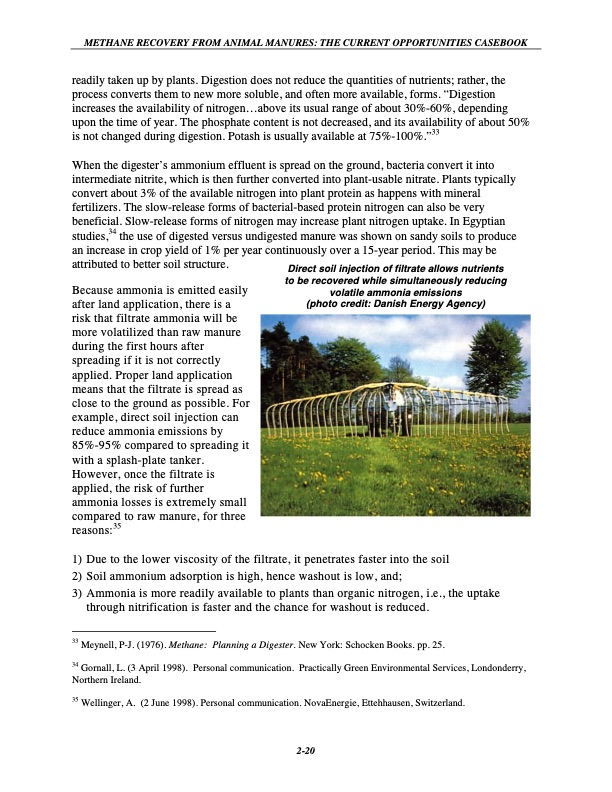
PDF Publication Title:
Text from PDF Page: 035
METHANE RECOVERY FROM ANIMAL MANURES: THE CURRENT OPPORTUNITIES CASEBOOK readily taken up by plants. Digestion does not reduce the quantities of nutrients; rather, the process converts them to new more soluble, and often more available, forms. “Digestion increases the availability of nitrogen...above its usual range of about 30%-60%, depending upon the time of year. The phosphate content is not decreased, and its availability of about 50% 33 is not changed during digestion. Potash is usually available at 75%-100%.” When the digester’s ammonium effluent is spread on the ground, bacteria convert it into intermediate nitrite, which is then further converted into plant-usable nitrate. Plants typically convert about 3% of the available nitrogen into plant protein as happens with mineral fertilizers. The slow-release forms of bacterial-based protein nitrogen can also be very beneficial. Slow-release forms of nitrogen may increase plant nitrogen uptake. In Egyptian 34 studies, the use of digested versus undigested manure was shown on sandy soils to produce an increase in crop yield of 1% per year continuously over a 15-year period. This may be attributed to better soil structure. Because ammonia is emitted easily after land application, there is a risk that filtrate ammonia will be more volatilized than raw manure during the first hours after spreading if it is not correctly applied. Proper land application means that the filtrate is spread as close to the ground as possible. For example, direct soil injection can reduce ammonia emissions by 85%-95% compared to spreading it with a splash-plate tanker. However, once the filtrate is applied, the risk of further ammonia losses is extremely small compared to raw manure, for three 35 reasons: Direct soil injection of filtrate allows nutrients to be recovered while simultaneously reducing volatile ammonia emissions (photo credit: Danish Energy Agency) 1) Due to the lower viscosity of the filtrate, it penetrates faster into the soil 2) Soil ammonium adsorption is high, hence washout is low, and; 3) Ammonia is more readily available to plants than organic nitrogen, i.e., the uptake through nitrification is faster and the chance for washout is reduced. 33 35 Meynell, P-J. (1976). Methane: Planning a Digester. New York: Schocken Books. pp. 25. Gornall, L. (3 April 1998). Personal communication. Practically Green Environmental Services, Londonderry, 34 Northern Ireland. Wellinger, A. (2 June 1998). Personal communication. NovaEnergie, Ettehhausen, Switzerland. 2-20PDF Image | Methane Recovery from Animal Manures The Current Opportunities Casebook

PDF Search Title:
Methane Recovery from Animal Manures The Current Opportunities CasebookOriginal File Name Searched:
biogas02.pdfDIY PDF Search: Google It | Yahoo | Bing
Capstone Turbine and Microturbine: Capstone microturbines used and new surplus for sale listing More Info
Consulting and Strategy Services: Need help with Capstone Turbine, sizing systems, applications, or renewable energy strategy, we are here to assist More Info
Container Lumber Dry Kiln: Since 1991 developing and innovating dry kilns using standard shipping containers More Info
Supercritical CO2 Lumber Dry Kiln: Compact fast drying in 3 days or less for small amounts of wood and lumber drying More Info
BitCoin Mining: Bitcoin Mining and Cryptocurrency... More Info
Publications: Capstone Turbine publications for microturbine and distributed energy More Info
FileMaker Software for Renewable Energy Developing database software for the renewable energy industry More Info
CO2 Gas to Liquids On-Demand Production Cart Developing a supercritical CO2 to alcohol on-demand production system (via Nafion reverse fuel cell) More Info
Stranded Gas for low cost power Bitcoin Mining Using stranded gas for generators may provide breakthrough low power costs for cryptocurrency miners. More Info
| CONTACT TEL: 608-238-6001 Email: greg@globalmicroturbine.com | RSS | AMP |